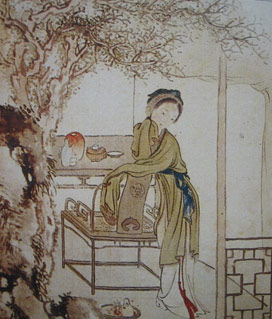
Dream of the Red Chamber or The Story of the Stone is an 18th-century Chinese novel authored by Cao Xueqin, considered to be one of the Four Great Classical Novels of Chinese literature. It is known for its psychological scope and its observation of the worldview, aesthetics, lifestyles, and social relations of High Qing China.
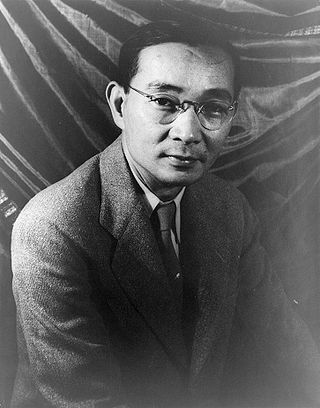
Lin Yutang was a Chinese inventor, linguist, novelist, philosopher, and translator. He had an informal style in both Chinese and English, and he made compilations and translations of classic Chinese texts into English. Some of his writings criticized the racism and imperialism of the West.
Gwoyeu Romatzyh, abbreviated GR, is a system for writing Standard Chinese in the Latin alphabet. It was conceived by Yuen Ren Chao, who led a group of linguists to develop the system from 1925 to 1926. From 1942 to 2000, a small number of reference works published in Hong Kong and overseas made use of the system, and Chao would use it throughout his later linguistics work, including in his most influential publications. However, Gwoyeu Romatzyh never achieved widespread use among the Chinese public. In places where it had been used, it was eventually replaced—largely by Hanyu Pinyin, which became the international standard romanization during the second half of the 20th century. Pinyin itself made use of principles originally introduced by Gwoyeu Romatzyh, whose influence is often reflected in the design of later systems.
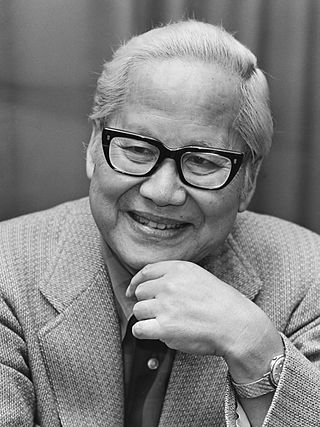
Keye Luke was a Chinese-American film and television actor, technical advisor, artist, and a founding member of the Screen Actors Guild.

The Museum of Chinese in America is a museum in New York City which exhibits Chinese American history. It is a nonprofit 501(c)(3) education and cultural institution that presents the living history, heritage, culture, and diverse experiences of Chinese Americans through exhibitions, educational services and public programs. Much of its collection was damaged or destroyed in a fire in January 2020. After being closed for more than a year following the fire, the museum reopened to the public on July 15, 2021.

Cài is a Chinese-language surname that derives from the name of the ancient Cai state. In 2019 it was the 38th most common surname in China, but the 9th most common in Taiwan, where it is usually romanized as "Tsai", "Tsay", or "Chai" and the 8th most common in Singapore, where it is usually romanized as "Chua", which is based on its Teochew and Hokkien pronunciation. Koreans use Chinese-derived family names and in Korean, Cai is 채 in Hangul, "Chae" in Revised Romanization, It is also a common name in Hong Kong where it is romanized as "Choy", "Choi" or "Tsoi". In Macau, it is spelled as "Choi". In Malaysia, it is romanized as "Choi" from the Cantonese pronunciation, and "Chua" or "Chuah" from the Hokkien or Teochew pronunciation. It is romanized in the Philippines as "Chua" or "Chuah", and in Thailand as "Chuo" (ฉั่ว). Moreover, it is also romanized in Cambodia as either "Chhay" or "Chhor" among people of full Chinese descent living in Cambodia and as “Tjhai”, "Tjoa" or "Chua" in Indonesia.

Lisa See is an American writer and novelist. Her books include On Gold Mountain: The One-Hundred-Year Odyssey of My Chinese-American Family (1995), a detailed account of See's family history, and the novels Flower Net (1997), The Interior (1999), Dragon Bones (2003), Snow Flower and the Secret Fan (2005), Peony in Love (2007) and Shanghai Girls (2009), which made it to the 2010 New York Times bestseller list. Both Shanghai Girls and Snow Flower and the Secret Fan received honorable mentions from the Asian/Pacific American Awards for Literature.

Eat a Bowl of Tea is a 1961 novel by American writer Louis Chu. It was the first Chinese American novel set in Chinese America. Because of its portrayal of the "bachelor society" in New York's Chinatown after World War II, it has become an important work in Asian American studies. It has been cited as an influence by such authors as Frank Chin and Maxine Hong Kingston. It was made into a film of the same name by Wayne Wang in 1989.

The Year of the Dragon is a play written by Chinese American playwright Frank Chin. It is one of the first plays by an Asian American playwright to be produced on a mainstream New York stage. It premiered in 1974 at the American Place Theatre, and starred Randall Duk Kim, who had played the lead in Chin's earlier play, The Chickencoop Chinaman. The rest of the cast included Pat Suzuki, Tina Chen, Conrad Yama, Lilah Kan, Doug Higgins, and Keenan Shimizu.
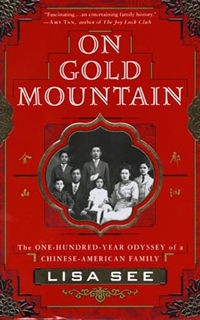
On Gold Mountain: The One-Hundred-Year Odyssey of My Chinese-American Family describes 100 years of author Lisa See's family history, providing a complex portrait of her family’s hard work, suffering, failures and successes as they moved from China to the United States. Speaking of the Chinese side of her family, See has said: "Things were so fractured and wild at home ... But the weekends with my grandparents became the real center for me ... It was the side of the family I identified more with. It was fun, romantic, solid".
The Joe Boys, or JBS, was a Chinese American youth gang founded in the 1960s in San Francisco's Chinatown. The Joe Boys were originally known as Joe Fong Boys, after its founder Joe Fong, a former member of the Wah Ching. Most of their members were born in Hong Kong or were of Hong Kongese descent.

Huang Yanpei is a Chinese historical television series based on the life of Huang Yanpei, a prominent educator, industrialist and politician who was also one of the founders of the China Democratic League. Directed by Hong Baosheng and Zhao Lei, the series starred Zhang Tielin as the eponymous character. The series was first broadcast on CCTV-8 in China on 27 May 2010.
Brian Yang is an American actor and producer, most known for his role as Charlie Fong in Hawaii Five-0.
Lin Tai-yi was a Chinese-American writer and translator. She was also known as Anor Lin or Lin Wu-Shuang.
Adet Lin was a Chinese-American novelist and translator. She also published under the name Tan Yun. She was also known as Lin Rusi.
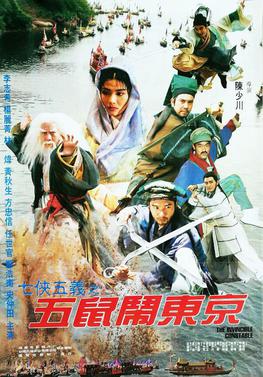
The Invincible Constable is a 1993 Chinese-Taiwanese martial arts comedy film directed by Hong Kong director Chan Muk-chuen, based on the 19th-century novel The Seven Heroes and Five Gallants. The film was shot in Dajinhu National Geopark (大金湖国家地质公园) in Taining County, Fujian, a protected area of China.
The Golden Melody Award for Best Vocal Recording Album has been awarded since 1990. From 1990 to 1996 there was an award called Best Recording Album designed to honor quality engineering for pop or instrumental recording albums; The award was discontinued from 1997 in a major overhaul of Golden Melody Award categories. The award category re-emerged in 2015, but was divided into two new awards, the Golden Melody Awards for Best Vocal Recording Album and Best Instrumental Recording Album.
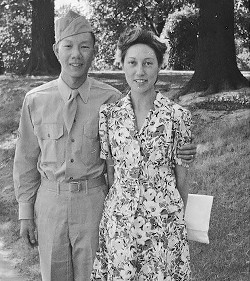
Gilbert Lester Leong (1911-1996) was a Chinese-American architect who designed churches and public buildings in the Los Angeles area. He was the first Chinese-American to graduate from USC with a degree in architecture. His designs helped shape the architecture of postwar Los Angeles and Chinatown. Leong was also a co-founder of the East West Bank in 1973. The bank was set up to serve the Chinese American community in Southern California.












